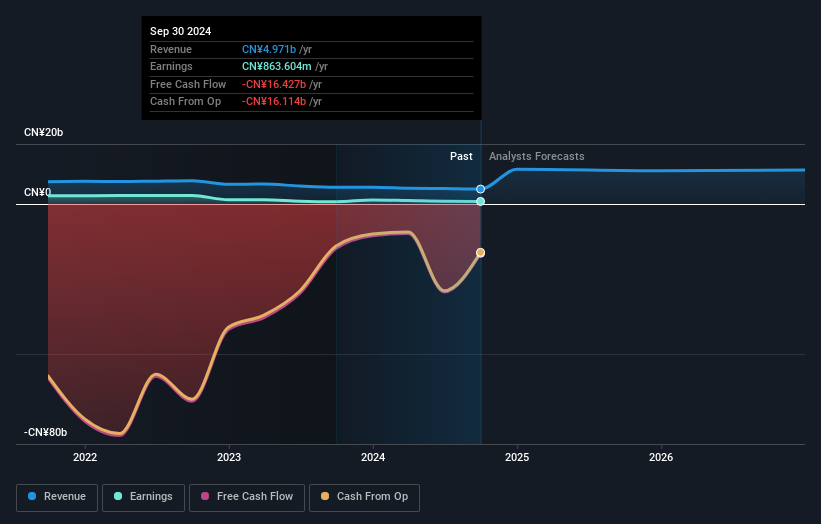Bank of Zhengzhou Co., Ltd.'s (HKG:6196) last week's 4.9% decline must have disappointed individual investors who have a significant stake

Key Insights
- Significant control over Bank of Zhengzhou by individual investors implies that the general public has more power to influence management and governance-related decisions
- 49% of the business is held by the top 25 shareholders
- Institutions own 15% of Bank of Zhengzhou
A look at the shareholders of Bank of Zhengzhou Co., Ltd. (HKG:6196) can tell us which group is most powerful. We can see that individual investors own the lion's share in the company with 50% ownership. In other words, the group stands to gain the most (or lose the most) from their investment into the company.
As a result, individual investors as a group endured the highest losses last week after market cap fell by HK$455m.
Let's take a closer look to see what the different types of shareholders can tell us about Bank of Zhengzhou.
Check out our latest analysis for Bank of Zhengzhou

What Does The Institutional Ownership Tell Us About Bank of Zhengzhou?
Institutions typically measure themselves against a benchmark when reporting to their own investors, so they often become more enthusiastic about a stock once it's included in a major index. We would expect most companies to have some institutions on the register, especially if they are growing.
As you can see, institutional investors have a fair amount of stake in Bank of Zhengzhou. This implies the analysts working for those institutions have looked at the stock and they like it. But just like anyone else, they could be wrong. If multiple institutions change their view on a stock at the same time, you could see the share price drop fast. It's therefore worth looking at Bank of Zhengzhou's earnings history below. Of course, the future is what really matters.

Hedge funds don't have many shares in Bank of Zhengzhou. Zhengzhou Municipal Finance Bureau is currently the largest shareholder, with 7.2% of shares outstanding. Meanwhile, the second and third largest shareholders, hold 6.7% and 4.2%, of the shares outstanding, respectively.
A deeper look at our ownership data shows that the top 25 shareholders collectively hold less than half of the register, suggesting a large group of small holders where no single shareholder has a majority.
While it makes sense to study institutional ownership data for a company, it also makes sense to study analyst sentiments to know which way the wind is blowing. While there is some analyst coverage, the company is probably not widely covered. So it could gain more attention, down the track.
Insider Ownership Of Bank of Zhengzhou
While the precise definition of an insider can be subjective, almost everyone considers board members to be insiders. Company management run the business, but the CEO will answer to the board, even if he or she is a member of it.
I generally consider insider ownership to be a good thing. However, on some occasions it makes it more difficult for other shareholders to hold the board accountable for decisions.
Shareholders would probably be interested to learn that insiders own shares in Bank of Zhengzhou Co., Ltd.. This is a big company, so it is good to see this level of alignment. Insiders own HK$186m worth of shares (at current prices). Most would say this shows alignment of interests between shareholders and the board. Still, it might be worth checking if those insiders have been selling.
General Public Ownership
The general public -- including retail investors -- own 50% of Bank of Zhengzhou. This size of ownership gives investors from the general public some collective power. They can and probably do influence decisions on executive compensation, dividend policies and proposed business acquisitions.
Private Company Ownership
We can see that Private Companies own 26%, of the shares on issue. Private companies may be related parties. Sometimes insiders have an interest in a public company through a holding in a private company, rather than in their own capacity as an individual. While it's hard to draw any broad stroke conclusions, it is worth noting as an area for further research.
Next Steps:
It's always worth thinking about the different groups who own shares in a company. But to understand Bank of Zhengzhou better, we need to consider many other factors. Case in point: We've spotted 2 warning signs for Bank of Zhengzhou you should be aware of, and 1 of them doesn't sit too well with us.
If you would prefer discover what analysts are predicting in terms of future growth, do not miss this free report on analyst forecasts.
NB: Figures in this article are calculated using data from the last twelve months, which refer to the 12-month period ending on the last date of the month the financial statement is dated. This may not be consistent with full year annual report figures.
Valuation is complex, but we're here to simplify it.
Discover if Bank of Zhengzhou might be undervalued or overvalued with our detailed analysis, featuring fair value estimates, potential risks, dividends, insider trades, and its financial condition.
Access Free AnalysisHave feedback on this article? Concerned about the content? Get in touch with us directly. Alternatively, email editorial-team (at) simplywallst.com.
This article by Simply Wall St is general in nature. We provide commentary based on historical data and analyst forecasts only using an unbiased methodology and our articles are not intended to be financial advice. It does not constitute a recommendation to buy or sell any stock, and does not take account of your objectives, or your financial situation. We aim to bring you long-term focused analysis driven by fundamental data. Note that our analysis may not factor in the latest price-sensitive company announcements or qualitative material. Simply Wall St has no position in any stocks mentioned.
About SEHK:6196
Bank of Zhengzhou
Provides various banking products and services in the People’s Republic of China.
Flawless balance sheet with proven track record.
Market Insights
Community Narratives



